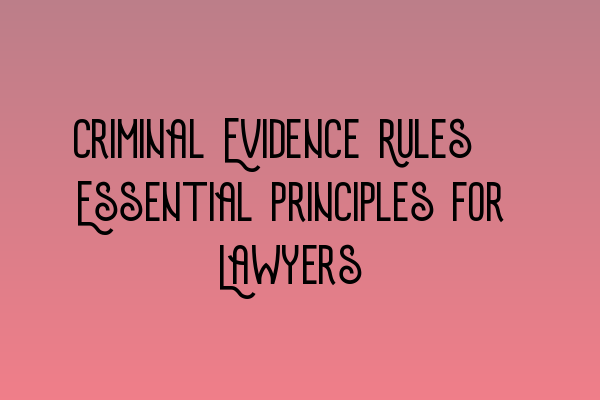Criminal Evidence Rules: Essential Principles for Lawyers
As a lawyer practicing criminal law, it is crucial to understand the fundamental principles of criminal evidence rules. A thorough understanding of these rules not only helps you build a strong case, but it also ensures that the evidence you present is admissible in court. In this article, we will explore the essential principles of criminal evidence rules that every lawyer should know.
Relevance
One of the key principles of criminal evidence is relevance. Relevance determines whether evidence is appropriate and necessary to prove or disprove a fact in the case. It is essential to establish a clear connection between the evidence and the issues at hand. Irrelevant evidence may be excluded by the court, potentially weakening your case. To learn more about the importance of relevance in criminal cases, check out our article on SQE 1 Practice Exam Questions.
Admissibility
Admissibility refers to the criteria that evidence must meet to be considered by the court. There are various rules and exceptions to consider, such as the exclusionary rule, hearsay rule, and character evidence rule. Each jurisdiction has its own set of admissibility criteria, so it is crucial to familiarize yourself with the specific rules in your jurisdiction. For more information on admissibility, you can check out our article on SQE 1 Practice Mocks FLK1 FLK2.
Chain of Custody
The chain of custody is a crucial aspect of preserving the integrity of evidence. It refers to the documentation and tracking of evidence from its collection to its presentation in court. Adhering to proper procedures ensures that the evidence remains untainted and its authenticity can be established. To learn more about the chain of custody and its importance, we recommend reading our comprehensive guide on SQE 2 Preparation Courses.
Exclusionary Rule
The exclusionary rule prohibits the use of unlawfully obtained evidence in court. If evidence is obtained in violation of a defendant’s constitutional rights, it may be deemed inadmissible. It is important for lawyers to understand the exceptions to this rule, such as the good faith exception and the inevitable discovery exception. For a deeper dive into the exclusionary rule, you can explore our article on SQE 1 Preparation Courses.
Expert Witnesses
Expert witnesses can provide specialized knowledge and insights to assist the court and the jury in understanding complex evidence. However, the admissibility of expert testimony is subject to certain criteria, such as relevance, reliability, and qualifications. Understanding how to effectively present expert witnesses can greatly enhance your case. To stay updated on the latest rules and guidelines for expert witnesses, you can refer to our article on SRA SQE Exam Dates.
These are just some of the essential principles of criminal evidence rules that lawyers need to be well-versed in. By staying informed and continuously updating your knowledge, you can ensure that you are effectively representing your clients and presenting strong, admissible evidence in court.
